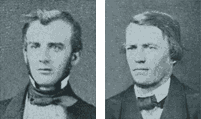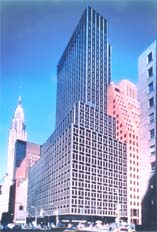|
|
|
|
| A Frolic of His
Own |
107.10 (119.32)
the Ainu: (pronounced
“I knew.”) Some of these details appear to be from EB’s short article
(1:439); Gaddis visited Japan in 1976 and may have learned something
about them then.
108.24 (121.12)
Elmer Rice [...] Tennessee Williams: American
dramatists (1892-1967; 1911-83). 108.25 (121.13) Jonathan Livingston [...] Siegal: Jonathan Livingston Seagull (1970) was a best-selling book of sentimental philosophy by Richard Bach. 108.41 (121.28) the Greenbrier:
a large historic resort in White Sulphur | |
| Abbreviated References A. Gaddis’ Books CG: Carpenter’s Gothic. 1985. New York: Penguin, 1999. FHO: A Frolic of His Own. New York: Poseidon, 1994. JR: J R. 1975. New York: Penguin, 1993. R: The Recognitions. 1955. New York: Penguin, 1993. B. Gaddis’s Sources Catton: Bruce Catton, The Army of the Potomac: Mr Lincoln's Army. Garden City, NY: Doubleday, 1962. EB: Encyclopædia Britannica. 14th ed., 1929. ODQ: The Oxford Dictionary of Quotations, 1st ed., 6th impression, (London: Oxford University Press, 1949). Gaddis owned this particular impression, given to him by Ormande de Kay in Paris in 1950. Plato: The Dialogues of Plato. Translated by Benjamin Jowett. New York: Random House, 1937. 2 vols. Prosser: William L. Prosser, Handbook of the Law of Torts, 4th edition (St. Paul: West Publishing Co., 1971). |
113.16 (126.34) a letter of Bernard Shaw [...] make ruinous mistakes’: from a 1937 letter to Cecil Lewis (Collected Letters, vol. 4 [NY: Viking, 1988]). 115.31
(129.31) MR BAGBY: the name
was probably taken from George W. Bagby, a Confederate Army clerk and
part-time newspaper correspondent mentioned in one of Gaddis’s sources
for AA: Arthur Loesser’s Men, Women and Pianos: A Social History
(New York: Simon & Schuster, 1954), 516.
This appears to be the vermifuges that Bagby purchased through one of
the sharpers that line up at his desk every morning. 124.3 (139.22)
What works?: William
James’s pragmatism in a nutshell. Cf. J R 530.13, 581.26. 124.28 (140.15)
‘Lay not up [...] break through and steal...’: Matt.
6:19. 126.26 (142.20)
Bull Run: a
stream in northeast Virginia near the town of Manassas, site of a battle
on 21 July 1861 in which the Confederates defeated Federal troops. Catton
notes that “carriageloads of distinguished sight-seers”
from Washington, DC, came to watch what they expected to be an easy
victory for the North (57). Southerners called it (and the second battle
of Bull Run in 1862) the battle of Manassas. 137.23 (155.9) Schuylkill County: in east central Pennsylvania. Pottsville is the county seat and was the site of the uprising of the Molly Maguirtes in the 1860s and 1870s. 140.26 (158.26)
Harpers Ferry: 141.12 (159.13)
a proclamation freeing the naygers: 146.1 (164.26)
Errol Flynn in The Charge of the Light Brigade: : a 1936 film famous for its spectacular battle scenes. Oscar and Lily later watch it on television (247 [279]). |
|
|
|
||
|
|
||
| A Frolic of His
Own |
A Frolic of His
Own
pages | |


